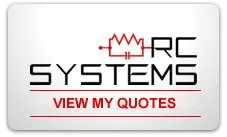Combustible Gases
R.C. Systems Combustible Gas Detectors feature both the Catalytic Bead and Infrared Sensors.
Catalytic Bead Sensors
The Catalytic Bead ("catbead" or "pellistor") sensor consist of a "reference bead" and an "analytic bead" wired into a Wheatstone bridge circuit. Catbeads burn a small amount of gas on the analytic bead which causes it to get hotter, increasing the resistance and voltage drop which creates an imbalance of the bridge circuit proportional to concentration.
Infrared Gas Sensors
The Infrared (IR) Sensor utilizes band pass filters to pass an analytical and a reference wavelength of IR light through a volume of the gas. The measurement is possible because some target gases absorb very specific wavelengths of IR light. Both the reference and analytical wavelengths are passed through the gas measuring path and reflected back onto the IR detectors. The presence of target gas will reduce the intensity of the analytical beam but not the reference beam similar to the way smoke affects visible light. The reference detector monitors the intensity of the two infrared sources and automatically compensates for loss of signal due to dirty optics or source aging.Learn More About the Combustible Gases our Sensors Detect
| Acetylene detection information |
| Acetone detection information |
| Ammonia detection information |
| Butane detection information |
| Ethane detection information |
| Ethanol detection information |
| Ethylene detection information |
| Ethylene Oxide detection information |
| Gasoline detection information |
| Heptane detection information |
| Hexane detection information |
| Hydrogen (catalytic bead only) detection information |
| Isopropyl Alcohol detection information |
| Methane detection information |
| Methanol detection information |
| Pentane detection information |
| Propane detection information |
| Propylene detection information |
| Refrigerant detection information |
| Styrene detection information |
| Vinyl Chloride detection information |


